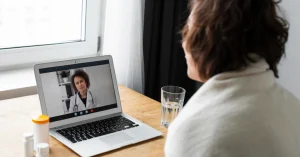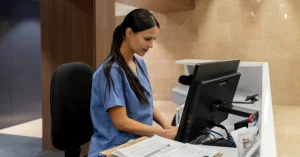In the current rapid-paced healthcare landscape, facilitating smooth patient access and coordination is more important than ever. But what if you could easily schedule new patients and oversee your workflows while simultaneously enhancing the quality of care you deliver? Introducing remote patient coordinator services — the next generation of healthcare management in 2025.
With our cutting-edge approach, your healthcare organization can take advantage of an effective, entirely remote system that streamlines scheduling, boosts patient satisfaction, and guarantees consistent care coordination.
Continue reading to discover how our remote patient care coordinator solutions can transform your operations, increase your team’s efficiency, and ultimately enhance the patient experience.
What is a Remote Patient Care Coordinator, and Why Does It Matter?
A patient care coordinator plays a pivotal role in healthcare management by ensuring patients receive the right care at the right time. Traditionally, this position has been in-office, handling tasks such as managing patient records, scheduling appointments, and addressing inquiries. However, advancements in remote work technology now make it possible for these critical tasks to be managed by care coordinators working from home.
The benefits of a remote patient care coordinator go far beyond convenience. By leveraging remote work, healthcare providers can:
- Streamline scheduling and workflows: A remote patient care coordinator can automate the scheduling of patient appointments, significantly reducing administrative burdens.
- Enhance patient satisfaction: Patients benefit from better communication and more personalized care, as coordinators have the tools to address their needs promptly.
- Cut operational costs: Remote positions allow businesses to save on office space and overhead expenses.
Ultimately, these advantages lead to a better patient care experience, improved efficiency, and reduced stress for both providers and patients.
How Our Patient Care Coordinator Services Work
Our remote patient care coordination services provide a seamless solution for your healthcare business. Here’s how it works:
1. Intake Coordination for New Patients
The first step in ensuring positive patient experiences is an efficient intake process. Our intake coordinators gather essential patient information, verify patient demographics, and manage documentation like medical records to ensure everything is in order before the patient’s first visit.
With our fully remote work environment, intake tasks are completed swiftly and accurately. This not only reduces delays but also allows healthcare providers to focus on what they do best — delivering exceptional care.
2. Automated Scheduling
By using advanced scheduling tools, our remote patient care coordinators handle patient schedules efficiently. Whether it’s managing follow-ups, booking urgent care appointments, or coordinating with specialists, our team ensures everything runs smoothly. Patients also gain access to an easy-to-use patient portal for self-scheduling and tracking their appointments.
This automation eliminates manual errors, minimizes patient no-shows, and optimizes your team’s work hours, ensuring a higher level of productivity and patient satisfaction.
3. Comprehensive Patient Support
Patients often have questions or concerns that require immediate attention. Our remote patient care coordinators act as patient advocates, addressing inquiries, resolving concerns, and ensuring every patient receives high-quality customer service. From managing patient records to addressing patient inquiries, our team’s expertise ensures seamless communication and better patient care.
Key Benefits of Remote Patient Care Coordination
Switching to a remote patient care coordinator work model isn’t just a trend — it’s a strategic move for healthcare providers looking to stay competitive in 2025. Here are some of the key benefits:
1. Improved Efficiency
With coordinator work from home jobs, you gain access to highly skilled professionals who can focus solely on administrative and coordination tasks. This leads to faster data entry, streamlined care plans, and better organization of electronic medical records.
2. Cost Savings
A remote care coordinator job allows healthcare providers to cut costs associated with physical office space and equipment. Additionally, outsourcing these tasks enables businesses to allocate more resources toward direct patient care.
3. Flexibility and Scalability
Remote services are flexible and scalable, making it easier to accommodate growth. Whether you need an additional intake coordinator or someone to manage specific tasks like behavioral health or urgent care scheduling, remote solutions offer the adaptability you need.
4. Enhanced Patient Experience
Patients appreciate seamless access to care, clear communication, and timely responses to their concerns. By implementing remote patient care coordination, you’re providing a superior experience that fosters patient trust and loyalty.
Who Can Benefit from Remote Patient Care Coordination?
Whether you’re a small clinic or a large healthcare organization, transitioning to a fully remote position for patient care coordination can transform your business. Here are some examples:
1. Urgent Care Centers
Urgent care providers rely on efficient scheduling and coordination to handle high patient volumes. Our services ensure that patients are seen promptly, and their medical records are up-to-date.
2. Behavioral Health Practices
Managing patient care in behavioral health requires specialized skills and attention to detail. Our team is trained to coordinate personalized care plans that meet the unique needs of each patient.
3. Home Care Providers
For home care providers, having a remote team that handles administrative tasks like managing patient records and scheduling allows your in-person staff to focus on delivering compassionate, hands-on care.
Frequently Asked Questions
1. What does a patient care coordinator do?
A patient care coordinator manages tasks such as scheduling appointments, handling patient records, and ensuring patients receive the care they need. They also act as a liaison between patients and providers, addressing concerns and coordinating care across multiple providers.
2. How does remote patient care coordination work?
Our remote patient care coordination services use advanced technology to automate administrative tasks, improve communication, and provide patients with easy access to information through a patient portal. This ensures efficiency and accuracy while enhancing the patient experience.
3. Can a care manager handle urgent care scheduling?
Yes, our remote patient care coordinators are equipped to manage urgent care appointments, ensuring patients receive timely and appropriate care.
4. Is remote patient care coordination secure?
Absolutely. We prioritize maintaining patient confidentiality and use secure systems to handle electronic medical records and other sensitive information.
5. How do I transition to remote patient care coordination?
Contact our team for a consultation. We’ll assess your needs, create a customized plan, and guide you through the transition to ensure a seamless integration.
Take the Next Step Towards Better Patient Care Management
In 2025, the future of healthcare is all about adaptability, efficiency, and patient-centered care. By incorporating remote patient care coordination into your business, you’re investing in a solution that simplifies operations, reduces costs, and delivers better patient care.
Don’t wait to transform your healthcare business. Contact Virtual RNs today to learn how our services can help you stay ahead of the curve and provide the high quality of care your patients deserve.




